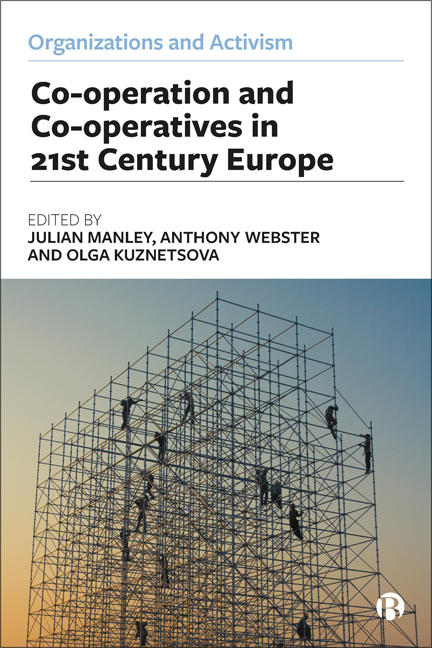Book contents
- Frontmatter
- Dedication
- Contents
- Series Editors’ Preface
- List of Figures and Tables
- List of Abbreviations
- Notes on the Contributors
- Acknowledgements
- Foreword
- 1 Introduction: European Co-operativism in a Changing World
- PART I Seeds: Identifying the Space for Co-operatives in Addressing Social Challenges
- PART II Bridges: Co-operative Culture and Education
- PART III Growth: The Preston Model, Co-operation and Community Wealth Building
- Index
7 - Co-operation for Asset-Based Community Development: The Example of the Community Explorers Project at Leicester Vaughan College
Published online by Cambridge University Press: 28 March 2024
- Frontmatter
- Dedication
- Contents
- Series Editors’ Preface
- List of Figures and Tables
- List of Abbreviations
- Notes on the Contributors
- Acknowledgements
- Foreword
- 1 Introduction: European Co-operativism in a Changing World
- PART I Seeds: Identifying the Space for Co-operatives in Addressing Social Challenges
- PART II Bridges: Co-operative Culture and Education
- PART III Growth: The Preston Model, Co-operation and Community Wealth Building
- Index
Summary
Introduction
Many contributions in this volume refer to the Preston Model which aims to use co-operation and co-operatives to build community wealth; significantly more nuanced delineations are available in the introduction. This chapter sits at an angle to this model, and is concerned with a Higher Education Co-operative using co-operative pedagogies to facilitate Assetbased Community Development (ABCD) in a project working with older people project which Leicester Vaughan College (LVC) completed in 2019. On one hand the Community Explorers project is quite different to many of the other examples in this volume; on the other it seeks broadly comparable goals, albeit in a different co-operative context. But using this example, in this chapter it is argued that cooperative pedagogy is particularly suited to projects seeking to build community capacity with adults generally, and ABCD. After discussing the Cooperative Identity and the bundle of cooperative pedagogies, it will consider the adaptability of coop pedagogies and their value in this kind of context. The chapter begins by exploring various terms and situating this work in the relevant literatures. The project itself is then discussed, finishing with reflections on how cooperative pedagogies were useful in building capacity in individuals within their communities. In doing this, the aim is to show how cooperative pedagogy and Education Co-operatives can have broad uses for the movement.
Co-operative learning and related terms
It is necessary first to clarify some nomenclature. Cooperative learning and related terms might be used to describe several connected but quite different things, partly because cooperative education has a long history. First, it might refer to cooperative training, sometimes called Cooperative Education and Training (CET): gaining the skills needed to be an effective cooperator or other forms of training within co-operatives in order that those in them can function – essentially technical training within the movement, whatever personal benefits and capacities might accrue as a result. As a subset of this, it might also refer to other types of learning within the movement, which across the long history of a global social movement which has had broad educational aims since its earliest days, encompasses an enormous range of undertakings (Baloche, 2011; Woodin, 2011, 2017, 2019).
- Type
- Chapter
- Information
- Co-operation and Co-operatives in Twenty-first-Century Europe , pp. 125 - 143Publisher: Bristol University PressPrint publication year: 2023

